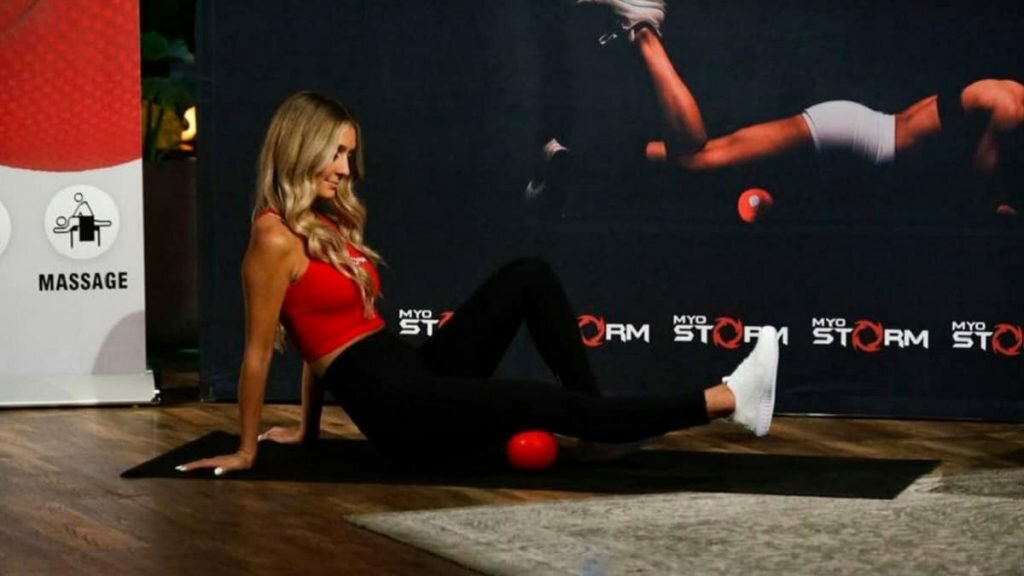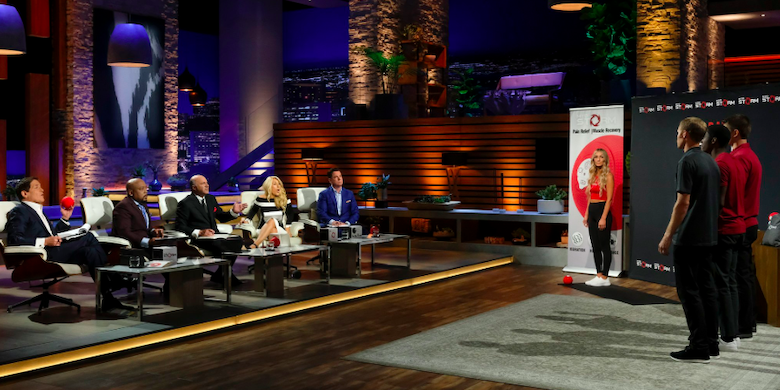The Basics
-
- Company: MyoStorm
- Owner: Jonothan “Jono” DePeri and Shaquille Walker
- Product: Vibrating, Heated Therapeutic Massage Ball
- Asking Price: $150,000 for 10% equity
- Final Deal: $150,000 for 5%, plus $1 royalty per unit sold until $500,000 recouped
- Shark Who Took The Bait: Lori Greiner
- Season/Episode: Season 11, Episode 5
MyoStorm Before Shark Tank
Jonothan “Jono” De Peri and Shaquille Walker are two friends from Provo, Utah, who worked as missionaries for their church. During that time, they decided they would someday create a product together but were not sure what it would be. Jono would later study mechanical engineering at Brigham Young University, and was involved in a project that measured how vibration affects the human body. According to his research, there were specific frequencies and amplitudes of vibration that could provide greater therapeutic benefits when treating muscle injuries.
Shaquille – who was training to be a runner – had experienced his fair share of injuries, and was intrigued by Jono’s research. Shaquille and Jono knew that this range of vibration frequencies was not being utilized in the current market of tools to treat pain and heal injury, so they brainstormed the idea of using this kind of vibration in an upscale massage “roller” that could treat pain and heal injury with better efficacy than what was currently available for purchase.
DePeri developed a prototype with the help of a team of researchers and called it the MyoStorm Meteor. The Meteor has three vibration settings that are backed by scientific evidence to provide superior results, and also has two heat settings. Soon, Jared Ward, a professional marathon runner and a statistics professor at BYU joined the team, and would accompany DePeri and Walker to pitch the Meteor to the sharks.
MyoStorm On Shark Tank
Jono, Shaquille, and Jared approached the stage. They were also joined by a woman who would demonstrate how the Meteor is used. Shaquille stated that 100 million Americans reported having chronic neck or back pain. He also revealed that $6 billion was spent on pain management in the U.S., and that most people were not getting the relief they needed despite spending all that money. In unison, the team chanted, “There had to be a better way.”
That’s why they created the Meteor. It was a patent-pending, FDA-compliant medical massage device that utilized cutting-edge technology, vibration, and heat therapy to reduce pain and speed up muscle recovery. It was lightweight and easy to use, and worked by combining pressure, vibration, and heat.
The Meteor was designed with professional athletes in mind but it could be used by everyone who experiences pain. The team was asking for $150,000 in exchange for 10% equity. “Who’s ready to roll with us?” they asked.
The balls – which were already turned on and heated – were then distributed to the sharks for trial. Every shark seemed to love it and Kevin thought it was fantastic. Mark went to the stage and placed the Meteor under his back while rolling over it on the ground. His groans indicated that it was working.
Lori wanted to confirm that what set this massage ball apart from competitors was the use of heat and vibration. Jono explained that he had studied how vibration affects the human body and used that knowledge to optimize the massage ball to provide the best relief. Then he added heat.
Jono then told the sharks how the Meteor had started a Kickstarter campaign with 1,000 units. Their goal was $20,000 but they brought in $70,000. The sharks were impressed by the success of the campaign.
Mark wanted to know about pricing and costs. Shaquille said they had tested price points between $130 and $175 and had settled on $160. The product cost $40 to manufacture. All of the sharks thought the price was expensive, but Shaquille said that competitors sell inferior products and they saw value in the Meteor since it was a product that stood apart from what was currently offered in the category.
Jared added that there are some products that cost $600, and while the traditional foam roller is only around $15, the Meteor was a superior product at a more affordable price than what was available at the high end. He also said that many people spend a lot of money on professional massages. One massage could cost as much as the price of the Meteor.
Mark thought that what differentiated their product was that you didn’t have to use it on the floor. You could even use it lying in bed.

Guest shark, Matt Harrington, asked how many total units had been sold. Jono said that they had sold 900 units and along with the Kickstarter, had made a total of $120,000 in sales. Kevin said that was not a lot.
Lori felt that the sales were not higher because the product was priced too high. Why was there such a high markup if their cost was only $40? Shaquille said their testing had shown the market was willing to pay a premium price. But Lori wondered if they had tested price points under $100. They hadn’t. Lori’s feeling was that they could have sold a lot more if it were priced under $100.
Mark disagreed, but Lori continued. She said there was always a price point freeze at $50 and $100. When you price under $50 and under $100, you sell a lot more product.
Matt asked about their vision for the future. Did they want to continue with direct-to-consumer sales or were they considering retail? Jono said he was open to retail sales.
Mark, after disagreeing with Lori about price points, explained why he thought a higher price could work. People who would buy this product already have experience using other tools that don’t work as well. They’re already educated about the category and they can see the perceived value in this new option.
Shaquille said their manufacturer told them they could likely get the cost down to $20 if they could sell 10,000 units.
Mark was ready to make an offer. He would give them $250,000 for 20%, but he would withdraw if the team were to consider offers from the other sharks. Matt asked if Mark would go in with him as a partner, but Mark declined.
Kevin interrupted and said he wanted to make an offer, and since Jono wanted to hear it, Mark dropped out – just as he said he would. Kevin would give them $150,000 for only 5% of the company, but would ask for a royalty of $1 per unit.
Matt wanted in, too. He said he could use his ability to reach the sports demo – which prompted Mark to tease Matt since he had a relatively low number of Instagram followers. That didn’t dissuade Matt, and he continued. He would offer exactly what the team had asked for: $150,000 for 10%.
Lori piped in. She wanted to know if they had goals to get the price down to below $100. If so, she would offer the same thing that Kevin offered.
The team had received so many offers that they wanted a moment to talk about it amongst themselves. When they came out of their huddle, they announced they would like to make the deal with Lori, which surprised all of the other sharks. But Jono liked Lori’s idea for getting the price down and wanted to work with her. He accepted Lori’s deal for $150,000 for 5% plus a $1 royalty.
Final Deal: $150,000 for 5% equity, plus $1 per unit sold until $500,000 recouped.
MyoStorm After Shark Tank
The MyoStorm team made their pitch in October 2019. Currently, the company has 10 employees and has an average monthly sales figure of $150,000. MyoStorm improved the original Meteor and now sells a 2.0 version that includes USB-C charging and an improved heat function. While the website shows the price as $149, It’s now on sale for only $99, which is exactly where Lori Greiner wanted it to be.
In a June 2020 interview, DePeri stated that the Meteor has a strong brand presence, helped by the fact that it’s an FDA medical device, which separates the product from the competition. He revealed that his team attends events where people can try the product, and that helps to strengthen the brand. Relationships with athletes that back the brand is also very beneficial.
Although MyoStorm’s sales surged directly after the Shark Tank experience – which is what usually happens after an episode airs – DePeri is happy with the slow and steady growth the company is experiencing today. His projection for 2020 revenue is $4 million based on the expected launch of several new products. DePeri believes that MyoStorm will see close to 100% growth each year for the next few years.
Disclaimer: The information provided in this article is strictly informational; Seo Insights is not affiliated with MyoStorm, SharkTank, or any of its subsidiaries.
